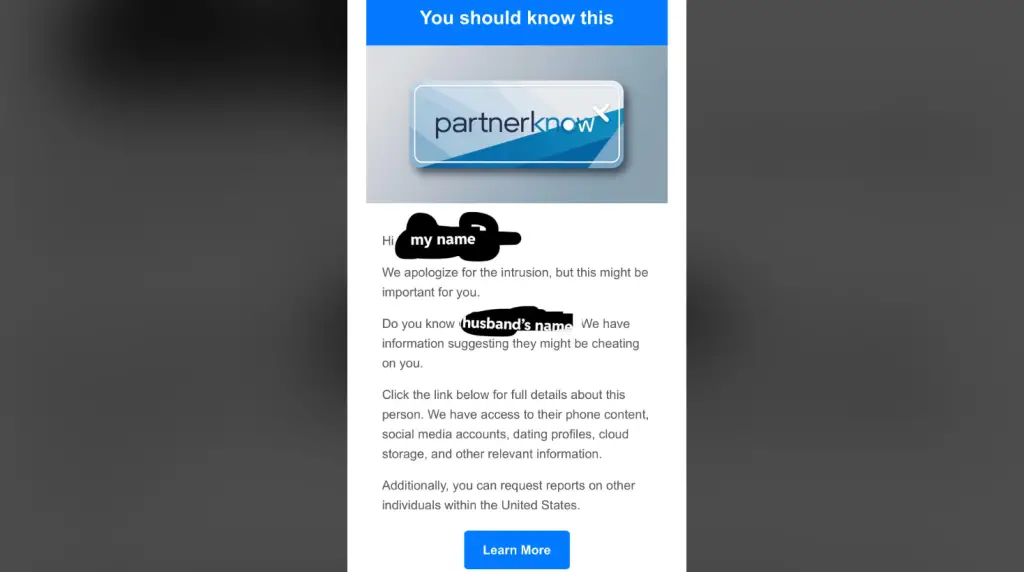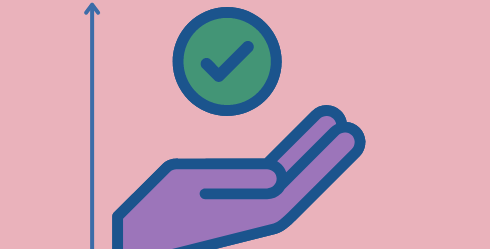Have you received an email from ‘PartnerKnow’ about your partner cheating on you? Beware, it’s a phishing scam. Scammers are sending out emails that claim the recipient’s partner is cheating on them. Clicking on the link would direct you to a malicious site which would steal your personal and financial information.
A Full Glance at The Partner Know Email Scam
The phishing email addresses the recipient by name and mentions the partner’s name and says he(she) is cheating on the recipient. The sender claims they’re a cybersecurity company and they’ve found information about the recipient’s spouse.
Then it mentions there’s a full backup of disk, address book, social media, history of viewing sites, dating apps, all files, phone numbers, and addresses of all the contacts. Which they’re willing to give full access to if you click on the link; partnerknow.com.
The email might appear legit because it mentions the recipients name and their spouse, however it has many red flags.
- There’s no image or video included in the email for proof
- Contains grammatical errors
- The website ‘partnerknow.com’ has been flagged as ‘dangerous’ by malware checker tools
- Partnerknow.com was registered on 11th November 2024 by an anonymous person. It isn’t a cybersecurity company but a malicious website used for spams.

How The Partner Know Email Scam Works
Like all phishing scams, the goal of this email is to get people to click on a malicious link. First, the scammers gather people’s information from hacking public records, wedding registries, RSVP sites, wedding planing sites, e.t.c. Then they send out tons of spam emails urging recipient to click on their link in order to download cheating files.
Creating an account and downloading files on the site might seem pretty harmless but it acts as a back door for the scammers. The malicious download may contain spyware — dangerous malware designed to steal information like; Credit card numbers, Bank account details, Passwords, Usernames, Social security numbers, and Other sensitive data.
Some types of malware may also give the attackers remote access to your device. Once your computer is infected, the cryptojacker starts working around the clock to mine cryptocurrency while staying hidden in the background.
Victims of this scam would either end up with stolen identities, lost or compromised information, damage to reputation, unauthorised credit card charges, malware infestation on their computer or devices, e.t.c.
Already Clicked on The Phishing Link? Actions To Take
If you had already clicked on the phishing link, here’s what you should do;
Don’t enter any information or interact with the website in any way (e.g., click other links or accept cookies).
Go offline on your device. This is very important because it interrupts whatever is happening behind the scenes. Disconnect from your Wi-Fi or turn on Airplane Mode on your phone — then you can safely investigate the attack further.
Check your device for malware. You can do this by using an anti-malware software. The scan should detect if your device has been infected and display the steps for removing malware.
Back up your files after removing the malware (it’s important to do this after not before so you wouldn’t backup an infected file). Then update your passwords and passphrases. For security reasons, don’t perform this step on the device you used when you clicked the phishing link — it should still be disconnected from the network
Helpful Tip
When planning a project ( wedding, buying a house or car, or taking out a loan) create and email address for that purpose. This would keep the footprint of your regular email addresses lower. It would also make it easier to track the related emails for organization as well as see what unintentional footprints they create.
See latest Scam – Mac Property Investments scam
